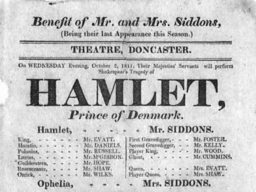Shakespearean acting royalty delights Yorkshire
This is a very special theatre playbill – one of thousands in a collection held by the British Library – as it shows one of the final performances of the acclaimed Shakespearean actress Sarah Siddons.
-
![]()
Much ado near me
Hear more Shakespeare stories on BBC Radio Sheffield
-
![]()
Shakespeare Festival 2016
The BBC celebrates the genius of the bard

And it’s not just her last show of the season - we see her here performing in Hamlet alongside her husband William as she approaches retirement from the stage.
The people of Doncaster are lucky to see the great actress Sarah Siddons (1755 – 1831) for a year later she was to retire at the age of 56.
Siddons was at the height of her powers as a tragedienne and Ophelia was one of the roles she had made famous alongside Desdemona, Rosalind, Katharine and Lady Macbeth. As Ophelia she was praised for her expression of grief mixed with terror at the behaviour of Hamlet.
But she hadn’t always played the tragic heroine - on a handful of occasions many years ago she became the first woman known to have played Hamlet. She did it in the provinces - Birmingham and Manchester in 1776 and Liverpool on 2 Oct 1778. For Liverpool there's a playbill (See Merseyside).
Why did she choose the provinces for her experiment?
She may have feared the London critics would denounce her impertinence and shred her reputation.

At a time when actresses were regarded as little more than prostitutes, Siddons took pains to lead an exemplary life as a respectable married woman.
Theatre could be a bit more spontaneous, possibly less reverential, out of the glare of London, and there was a perception that audiences around the regions were less hidebound by convention.
Her roots were in the English regions as she was born into a family of strolling actors, like Shakespeare’s own company of actors more than a century ago, who were used to life on the road.
So she felt more at home there – in fact there are accounts of her dislike of the noise and bustle of the capital on the occasions that she performed there.
Although her husband was a respected actor, she was really the family breadwinner, the brighter talent and the bigger draw at the box office.
As a struggling actress she earned about £3 a week, but at the height of her popularity Siddons was earning £4000 to £5000 a year - an enormous sum at the time.
Audiences loved her Shakespearean heroines – she was known as “the Tragic Muse" – and sometimes the most fervent fans swooned at the thrill of seeing the actress perform!
There was no secret to her success - she was resilient, she worked hard (and through several pregnancies) and she learned her lines.
...I have resolved to go down to posterity on the hem of your garment.
Sir Joshua Reynolds painted a famous portrait of her - Mrs. Siddons as the Tragic Muse in 1784 - and signed it on the hem of her dress, "for," he told her, "I have resolved to go down to posterity on the hem of your garment.”
On 29 June 1812 she gave perhaps the most extraordinary farewell performance in theatre history. She was playing her most famous role, Lady Macbeth, and the audience refused to allow the play to continue after the end of the sleepwalking scene. Eventually, after tumultuous applause from the pit, the curtain reopened and Siddons was discovered sitting in her own clothes and character — whereupon she made an emotional farewell speech to the audience lasting eight minutes.
Although this marked her formal retirement, she never quite abandoned the stage, returning now and then for special one-off performances.
About Shakespeare on Tour
From the moment they were written through to the present day, Shakespeare’s plays have continued to enthral and inspire audiences. They’ve been performed in venues big and small – including inns, private houses and emerging provincial theatres.

BBC English Regions is building a digital picture which tracks some of the many iconic moments across the country as we follow the ‘explosion’ in the performance of The Bard’s plays, from his own lifetime to recent times.
Drawing on fascinating new research from Records of Early English Drama (REED), plus the British Library's extensive collection of playbills, as well as expertise from De Montfort University and the Arts and Humanities Research Council, Shakespeare on Tour is a unique timeline of iconic moments of those performances, starting with his own troupe of actors, to highlights from more recent times. Listen out for stories on Shakespeare’s legacy on your BBC Local Radio station from Monday 21 March, 2016.
You never know - you might find evidence of Shakespeare’s footsteps close to home…
Craig Henderson, BBC English Regions

Related Links
Telling the story of Shakespeare in Sheffield.
-
![]()
Ira Aldridge stars in Doncaster
The African Roscius plays in Doncaster's Theatre Royal
-
![]()
Shakespeare's 'The King's Men' in Doncaster
They returned to the town on many occasions
Shakespeare on Tour: Around the country
-
![]()
Lancaster Theatre sparkles with Shakespearean talent
The Grand Theatre in Lancaster, which was once managed by Stephen Kemble
-
![]()
Reading’s Puritans turn away Shakespeare
Shakespeare's men paid not to play in Reading
-
![]()
Belvoir Castle
Belvoir Castle, home of the Duke of Rutland
-
![]()
Did Shakespeare visit Bristol in 1597?
Civic accounts show a high amount of performances in Bath








